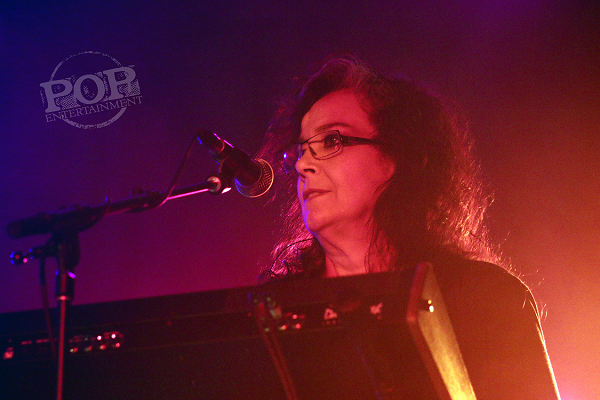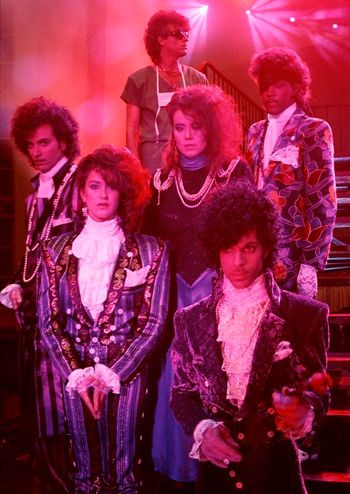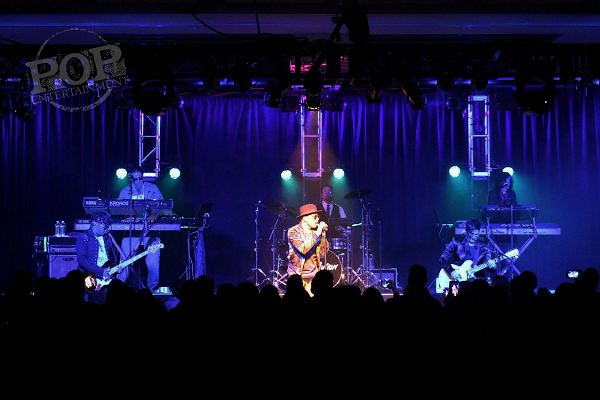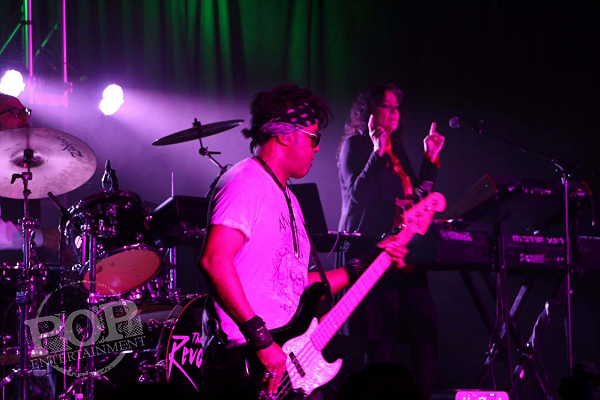Talking ‘Bout The Revolution with Lisa Coleman
- PopEntertainment

- Mar 6, 2018
- 10 min read
Updated: Jun 12, 2025

The Revolution – SugarHouse Casino – Philadelphia, PA – March 9, 2018 – Photo by Nick Bergmann © 2018
Talking ‘Bout The Revolution with Lisa Coleman
By Jay S. Jacobs
The Revolution love what they are doing, but they hate the reason that they have to do it.
The group, made up of Wendy Melvoin (guitar, vocals), BrownMark (bass, vocals), Lisa Coleman (keyboards, vocals), Matt Fink (aka Dr. Fink, keyboards) and Bobby Z. (drums), is still best known as Prince’s band during arguably the musical icon’s most fertile period. They played on such classic albums as 1999, Purple Rain, Around the World in a Day and Parade. They also played themselves in the film Purple Rain.
The Revolution was disbanded in 1987, when Prince decided he wanted to work with other musicians and make the Sign ‘O’ the Times album a solo platter. (The Revolution had recorded quite a few of the songs that ended up on that two-record set in the unreleased Dream Factory project.) Melvoin and Coleman started recording together under the group name Wendy & Lisa, doing five albums together, as well as a lot of movie and television soundtrack work. The other guys have had long careers as songwriters, producers and musicians-for-hire.
In the decades since, The Revolution played together as a band occasionally, but mostly went their own ways musically. However, everything changed on April 21, 2016, when Prince died way too young, due to an accidental opioid overdose. As a way of dealing with the loss of a friend, they started playing together. It felt right, so they decided to do some shows as a tribute to Prince. That reunion has stretched out for over a year now, including an upcoming show on March 9 at the SugarHouse Casino in Philadelphia.

The Revolution – SugarHouse Casino – Philadelphia, PA – March 9, 2018 – Photo by Nick Bergmann © 2018
We caught up with Lisa Coleman to discuss the band’s place in music history and the reunion shows.
I can’t wait to see your show in Philadelphia next week. How does it feel to be playing this music again after all these years?
It feels great. There’s been a lot of mixed feelings, of course. We came together over something tragic and horrible. It’s been an evolution for The Revolution.
Had you been in touch with Prince over the years?
Yeah, of course. We saw each other from time to time. I hadn’t seen him in a little while. He [used to] drop by my studio. He would just come and say hi.
How did you find out he had died?
I was asleep. My wife was awake, and people were texting her. She turned on the TV and she was seeing all the news. She wanted to make sure that it was true before she woke me up and told me. She was right, too, because the first thing I said when she told me was, “It’s a mistake. It’s a hoax. That’s impossible.” I just couldn’t believe it.
Were you surprised to find out about his problem with pain-killing drugs?
Yes and no. I had heard that he was having some trouble with that and with surgeries and things like that, so I figured he was having a struggle with it. I know that can happen pretty easily. But, we weren’t like that when we were a band. We were sober. Not intentionally sober, but we just weren’t like that. We didn’t get high and stuff. So, yeah, it was kind of heartbreaking.
I know you have been working with Wendy for decades after the Revolution stopped. How did you all decide you wanted to get back together to honor the music you made with Prince?
When we got together with the guys, it was just a way of processing what happened. I’ve said this before, but for us it was like when somebody dies, and you go and take out the old photo albums. For us, it was like the songs were the photos. That was just the way that we knew how to be together. We just felt like we needed to be together.

Prince and the Revolution
It made perfect sense that the first reunion show was at the First Avenue (the famous Minnesota nightclub which was featured in Purple Rain). How did it feel to play back at the band’s unofficial home?
That was incredible. It was highly emotional. We had planned to just play there for one night, but the response was so big that we ended up playing three shows there. That was really difficult. I’ll just tell you that at the end of the third show, when we went in the dressing room, all five of us burst into tears. The first night was really tentative and emotional. We were scared. It was so strange to start playing that music, in that room, and he’s not going to walk in the door. It was like living the impossible.
What is it like to work with the other guys again? I know it’s bittersweet, but is it nice to have them back in your life?
It absolutely is. We’ve all been so pleased. It’s been a beautiful reunion, getting to know each other again, and finding out that we still get along so well. We’ve been in touch over the years, here and there, but not a lot. Spending this time, it was so natural. It was just getting back on the bicycle. There’s a lot of love there. It’s really astounding. I’m really happy to have that back in my life.
Since obviously Prince was the main focal point of much of the music, how does the Revolution handle these classic songs? Do you have different people singing lead, or perhaps do some of the songs as instrumental?
That was the biggest problem to solve. It was easy to find the answer. It’s the audience. It’s the fans. They can sing now. We encourage everybody to sing along. We sing all the songs ourselves. Then it’s like we’re giving it back to the people. You’re the lead singers now. These songs are yours. That’s our main philosophy. Having said that, we do have guest singers from time to time. We’ve had Stokley Williams [lead singer of the band Mint Condition] with us on most of the shows. He comes out and sings a few songs. He’s great, because he’s good with the crowd. Wendy and Mark are up in front, but they’re both holding their instruments, so it’s hard to be the crowd-pleaser. I think Stokley is going to be with us there in Philly. I hope so.

Prince and the Revolution
“Sometimes It Snows in April,” a song which you and Wendy wrote with Prince, got a lot of airplay after his unfortunate passing. How did it feel to see that song being exposed to a whole new audience?
I don’t know how to feel about it. I think it’s amazing and makes sense, but I really wouldn’t mind not having a success [for that reason…] (laughs) You know what I mean?
Do you look at the songs in a different light now that you are performing them without Prince?
Yeah. I didn’t expect to, but even now – we played last week – and the songs just keep renewing. They are refreshed. With everything that’s going on in the news, and the world. I kind of knew it all along, but it seems to be more real all the sudden. So many topics that Prince wrote about, and that we sang about, are still completely valid right now. They stay. We still need to be hearing these words. We need this energy. It’s been incredible, the response from the crowd. People just really thanking us for doing it, because they need the catharsis. They need the support. They need to know that sort of love is still out there. That’s our cause now. We don’t have an album to promote. We’re not out there doing a promo tour, which is what most tours are. This is just purely a soul endeavor. The payoff is completely personal. We’re not making a bunch of money or anything. We make a few bucks here and there, to pay our crew and to fly and pay for hotels and stuff like that. But, it’s really a personal journey for us, to connect with people. It’s been amazing like that.
You weren’t even out of your teens when you started playing for Prince – even before the Revolution was an official thing. How did you get involved in playing for him?
One of my best friends in high school [Niki Yoergler] – she dropped out of school and ran away from home. She ended up getting a job at Prince’s management company. She was Steve Fargnoli’s secretary. [Fargnoli was Prince’s long-time manager, who stopped working with Prince a year or so after the Revolution did.] It was right before Dirty Mind. Prince was looking for a girl keyboard player. She recommended me. I sent a tape to Prince – a cassette, if anybody [still] knows what that is. (laughs) He liked it, so we met, and the rest is history.
Is the Revolution just performing songs from albums you did with him, or do you do more music from other albums, or even your albums as Wendy and Lisa, or the guys’ outside work?
Right now, we’re just playing songs from the albums we were involved with.

The Revolution – SugarHouse Casino – Philadelphia, PA – March 9, 2018 – Photo by Nick Bergmann © 2018
The albums that the Revolution played on were arguably the most important ones in Prince’s career – 1999, Purple Rain, Around the World in a Day, Parade – what was it like to be a part of such iconic albums?
My life, it was incredible, because it was highly creative. It fit in for me, because I grew up classically trained on piano, so there is a lot of discipline involved. One thing that I connected with Prince, when we first met and first started rehearsing, was that same kind of discipline. I hadn’t experienced that in bands. I had been in bands with people, and usually it was more casual. You go to rehearsal and you’re like hanging around and jamming. (laughs) Like, oh, let’s run through the song. With Prince it was really a great discipline. It was a great way to learn how to translate that into a band situation. It was just work, work, work, work, work. All that preparation and practice was so smart, because when you go out and your band starts to make it, and you get bigger and bigger crowds, it’s really distracting and hard to concentrate. People are screaming at you. If you are well-rehearsed, it’s just in your body. Prince was smart enough to know how to control the situation. It was pretty amazing.
Well, how crazy was it just to live through those times, the touring, the TV, the hit singles? Did it all get a bit surreal to be a part of?
Absolutely. And we didn’t know the half of it. We just had our heads down, working. It would be sometimes after the fact that we would find out. Wow, that was that big? That went to number one? Oh, my God! It’s still surreal. (laughs)
You played a fictionalized version of yourself in Purple Rain. What was the filming of that movie like, and at the time did you ever imagine it would become as huge as it did?
No. I really didn’t. I don’t think any of us thought it was going to be as big as it was going to be. We thought we were making a cool cult film, or something. We were out there filming, in minus 20 degrees. It was kind of guerilla in a way, maybe because it was in Minneapolis, and the weather was so horrible. (laughs) It felt like guerilla warfare, busting into this club, and we had to keep the door half open, because there were generators outside. So, it was freezing in there all the time. We didn’t know what we were doing. Trying different outfits on. We discovered it as we went. Then, I just remember that when Purple Rain premiered, it was such a big deal. All of the sudden we were like: Oh, we’re going to take limousines. We had hired the best makeup artists in Hollywood. It’s like a movie about success. A star is born.

The Revolution – SugarHouse Casino – Philadelphia, PA – March 9, 2018 – Photo by Nick Bergmann © 2018
They have been releasing a lot of unreleased music from Prince’s vaults at Paisley Park. As one of the musicians, how do you feel about that? On one hand, it must be cool to hear some of those old songs again. On the other hand, a lot of those songs were demos or unfinished.
Yeah. Exactly. Absolutely. Even his worst songs were still really good, so it’s great that stuff is going to be heard. But, yeah, the band, we all feel kind of like: “Oh, let us get our hands on it first.” Prince wouldn’t be too keen on [the unfinished versions getting out]. Let us mix it, fix it or something. Make sure that it’s up to par, something Prince would be proud of. There’s a reason it’s in the vault, you know? (laughs)
As a musician, and a friend, and even just as a fan, what are some of Prince’s songs that you most closely identify with?
That changes a lot, but, for some reason, “I Would Die 4 U” is something that just always hits me. We play it every show, and every time when that first chord hits, it just fills me with joy, and sadness, and fullness of emotion. I’m hit with those lyrics, and I’m just stunned by the beauty of what he wrote. That’s one of my favorites.
You and Wendy have been doing your own music for decades – both as a band and also in soundtrack work. Is it a little weird to go back to performing music by another writer, even one who you were so close with?
(Laughs) Yeah. Mostly just as a musician, as a player. I compose all day. I’m sitting at my keyboard writing and playing all day long. It’s so different to get up and play with a drummer, and in front of people. In a way, it’s so much easier. The pressure [is off]. It’s a relief. It’s actually a relief to play these songs. To be older now and it’s like I can do this. I’m really good at this. It’s not as hard as it was when I was younger, for some reason. It’s an experience. It’s a true gift. If you could go back in time, this is what it would be like. (laughs)
Has the touring brought an urge to do some writing together and to record some new music with the Revolution?
Yes. Every day at soundcheck we’ll start jamming, and we call out to our sound man Scotty, “Scotty, record this!” So, we’ll see. We might try to stretch out and put out some new music.
Copyright ©2018 PopEntertainment.com. All rights reserved. Posted: March 6, 2018.
Photos:
#1 © 2018 Nick Bergmann. All rights reserved.
#2 © 2018 Nick Bergmann. All rights reserved.
#3 © 1984 Larry Williams. Courtesy of MAD Ink PR. All rights reserved.
#4 © 1984 Nancy Bundt. Courtesy of MAD Ink PR. All rights reserved.
#5 © 2018 Nick Bergmann. All rights reserved.
#6 © 2018 Nick Bergmann. All rights reserved.
#SignOTheTimes #PurpleRain #Minneapolis #DirtyMind #Minnesota #LisaColeman #BobbyZ #IWouldDie4U #prince #FirstAvenue #MattFink #PrinceandtheRevolution #Parade #JaySJacobs #DreamFactory #1999 #BrownMark #AroundtheWorldinaDay #PaisleyPark #SometimesItSnowsinApril #wendymelvoin #TheRevolution #philadelphia #SteveFargnoli #DrFink #SugarHouseCasino #WendyandLisa #NikiYoergler











Comments